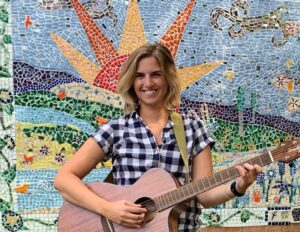Music and Memories: Creating Connection and Community in Music Therapy at Paul’s Run
August 4, 2021
 Music therapist at Paul’s Run, Molly Bybee, has been involved in band, choir, and all things music since childhood. Combining her passion for music with her career, she helps residents at Paul’s Run develop meaningful connections with their friends and neighbors through music therapy.
Music therapist at Paul’s Run, Molly Bybee, has been involved in band, choir, and all things music since childhood. Combining her passion for music with her career, she helps residents at Paul’s Run develop meaningful connections with their friends and neighbors through music therapy.
“Growing up I was always into music and participating in band and choir. I got my Bachelor’s degree in Vocal Music from Truman State University and then went on to get my Master’s in Music Therapy from the University of Kansas,” she says. Molly first discovered Paul’s Run when she visited her friend who lived in Philadelphia.
“A recruiter from Paul’s Run called me and wanted to schedule an interview and my flight was leaving within the next 30 hours to return home. We somehow made the interview happen, and from there it was history,” Molly reminisces. Molly began working as Paul’s Run’s Music Therapist in January of 2017 and has greatly enjoyed building meaningful relationships with residents and team members throughout the years.
“When I first came to the community I immediately noticed how friendly the residents and team members were. On my first tour everyone was smiling and just very welcoming,” she says. As the community’s music therapist, Molly has a variety of programs that engage residents across all levels of care. “One of the great things about working at Paul’s Run is that across all three levels of care there is truly a longevity in the relationships I develop with our residents,” she explains.
My ultimate goal with music therapy is to create a sense of community and well-being for our residents. One of the core benefits of our music therapy programs is when residents come together, share music, and feel that they are an important part of our community.
Music Therapist at Paul’s Run, Molly Bybee
Molly leads an array of programs and events including her new debut of Broadway Sing. This special program is a sing-along activity that is streamed across the community’s exclusive TV channel and Facebook Live. The lyrics of residents’ favorite songs appear on screen alongside Molly singing and playing her piano.
Additionally, Molly has a weekly music therapy group, Music and Memories, in which residents come together and share music while reminiscing in memories of the past. She also helps direct the Paul’s Run Handbell Choir which meets twice each week to practice their songs. There is also the Paul’s Run Singers choir which includes residents from all levels of care. “We have a concert scheduled for the end of September so we’re pretty excited for that,” she says. Molly meets with residents on an individual basis as well, helping them accomplish a variety of psycho-social, cognitive, and physical goals.
The Benefits of Music Therapy
I love Molly’s music therapy programs. They make me feel so good every time I participate. I used to sing when I was younger and Molly’s classes bring back so many wonderful memories for me.
Janet S., resident of Paul’s Run
As residents sing alongside Molly in a variety of music therapy programs, they receive innumerous benefits for their overall well-being. “Our music therapy programs help residents feel like they are a part of something and truly give them a sense of accomplishment and success,” Molly explains. “Music therapy also offers cognitive benefits as we focus on long-term memory and reminiscence while residents share memories of music from their childhood,” she adds. Molly also explains that music therapy can benefit residents’ physical well-being as her classes incorporate movement and playing of different instruments.
As Molly makes a positive impact on residents’ overall well-being, her programs bring residents great happiness and socialization with friends. “What I enjoy most about music therapy is engaging with our residents and listening to them share their stories. Being a music therapist, people are always happy to see me because they look forward to our programs,” Molly laughs. “Residents love participating in music therapy because it’s an opportunity for them to meaningfully engage with others, and when they leave they feel relaxed and happy and more connected to their community and fellow residents.”
